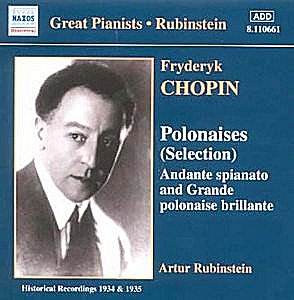Fryderyk CHOPIN
6 Polonaises, opp.26, 40, 44, 53; Polonaise-Fantaisie, op.61; Andante
spianato and Grande Polonaise Brillante, op.22
 Artur Rubinstein (pianoforte)
(rec. 1934-5, London, Abbey Road)
Artur Rubinstein (pianoforte)
(rec. 1934-5, London, Abbey Road)
 Naxos 8.110661
[64.16]
Naxos 8.110661
[64.16]
Crotchet
AmazonUK
AmazonUS

These recordings are a little earlier than those of the Mazurkas I was
recently reviewing on Naxos, and the Polonaises
contain far more strenuous pages to test the primitive recording equipment.
It is more immediately evident that these are not modern recordings, yet
the Naxos engineers have obtained a generally pleasing, if limited, sound
and the ear soon tunes in and concentrates on the enthralling playing.
Not long ago I was reviewing the reissue
of Rubinstein's 1964 versions of these pieces. Naxos are perhaps a little
pedantic in labelling the disc "Polonaises (selection)" for Rubinstein remained
steadfast throughout his career that these eight, the only ones acknowledged
by Chopin himself, were the true canon. Most other performers have followed
him in this though the Polish edition includes another nine (which may not
all have been known in 1934) and already in 1929 Ignaz Friedman had shown
that there was plenty to be extracted from op.71/2 at least.
I was somewhat dismayed at the deliberation with which the first four pieces
were expounded in 1964. Thirty years earlier Rubinstein's romantic flame
burnt more strongly and these performances are thrilling in their youthful
ardour. But when we come to the mighty op.44, which I described as a
"surpassingly great performance", nothing in 1935 prepares us for the proud
defiance, the passionate lament for a country which in 1964 seemed more
terminally oppressed even than in Chopin's day. Just sometimes I shall return
to the tumultuous virtuosity of the earlier version but the 1964 one is visionary
and irreplaceable. Honours are more even with op.53. In 1935 the war-horse,
despite its pedigree, frisked ahead at times, but one side of the music is
here though by a small margin I think the sheer majesty of the later version
has the edge. As regards that glorious tone-poem (far more than just a Polonaise)
that is op.61, there is no contest for in 1934 Rubinstein was still looking
at the music from the outside, like a gifted student who has yet to learn
that you don't play Chopin as if it was a Rachmaninov Concerto.
So the mature Rubinstein excelled in the mature Chopin? Not necessarily,
for I find the later Andante spianato more beautiful and the later Grand
Polonaise Brillante has more sleight of hand, yet these are youthful pieces.
In the former it seems that Rubinstein now has such an individual feeling
for every note, making magic of a left hand that previously just rippled
away. While in the latter the tempo is barely slower but he seems to have
all the time in the world to make his points. Undoubtedly it was this extra
feeling he developed over the years for each single note which led him into
slower tempi and I admit that this time I found the 1964 op.40/1 decidedly
impressive - it moves with the grinding inevitability of an army of tanks,
though it becomes a long haul and on balance I still stand by the 1934 one.
So my conclusion is to urgently recommend both as indispensable documents
(Naxos discs cost next to nothing after all). Between the two you will have
a supreme performance of each work. And if you go back and forth deciding
which is the supreme performance of each piece, and why, you will
have pleasure, instruction and inspiration to fill your rainy evenings for
many years to come.
One last point. Rubinstein recorded so extensively that little has been done
so far to investigate the numerous live performances which must survive,
often in perfectly respectable sound, in radio archives around the world.
The reined-in quality of some of his later studio recordings was not often
present, even in extreme old age, when he had an audience in front of him.
Can we look forward to some live Rubinstein before too long?
Christopher Howell

